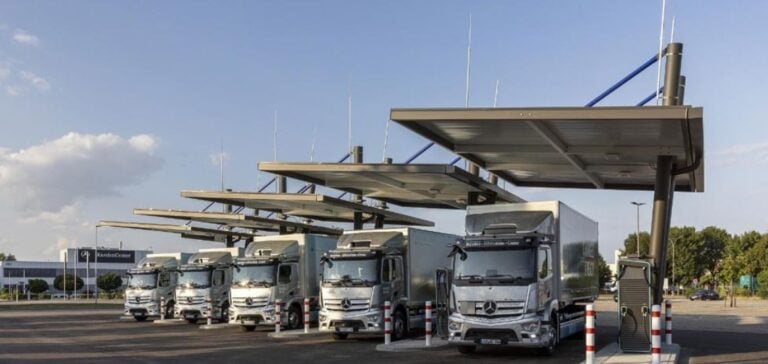Truck manufacturer MAN, part of the Traton Group (a Volkswagen subsidiary), and energy company E.ON have unveiled an ambitious project for the electrification of road transport in Europe. The two companies plan to set up 170 electric truck recharging stations, equipped with 400 charging points. These installations are designed to make up for the continent’s glaring lack of charging infrastructure, a major obstacle to the transition to greener transport. In addition to electric trucks, the European Union isalso encouraging the installation of charging stations for cars.
By the end of 2025, the first 80 stations should be operational. The geographical breakdown includes 125 stations in Germany, with the remainder in Austria, the UK, Denmark, Italy, Poland, the Czech Republic and Hungary. Each station will be equipped with 400 kW charging stations, enabling trucks to recharge up to 300 kilometers in around 45 minutes.
Context and objectives of the European Union
MAN and E.ON’s initiative is part of a race towards electrification dictated by the European Union’s targets, which aim to reduce CO2 emissions from heavy commercial vehicles by 65% by 2035. At present, the charging network for electric trucks in Europe is almost non-existent. According to MAN, around 50,000 charging points would be needed to cover the continent’s truck recharging needs.
This initiative is not the first of its kind. By 2022, the Volkswagen subsidiary had already co-founded the Milence joint venture with Daimler and Volvo, aiming to install 1,700 charging stations in 300 stations by 2027. To date, however, only three stations are operational.
Essential public funding and support
To accelerate the development of this infrastructure, the sector is calling for public funding. MAN CEO Alexander Vlaskamp stressed the urgent need for support from political decision-makers to roll out this network on a large scale. Expert Kim Kohlmeyer of the NGO Transport&Environment also stressed the need for this network for long-distance trucks, noting that 80% of the energy charged should come from private charging stations installed by the hauliers themselves.
The transition to electric vehicles is underway, but current figures remain modest. Fewer than 12,000 electric trucks were sold in Europe between 2018 and 2023. However, sales are expected to accelerate over the next few years, as the charging infrastructure develops.
The MAN and E.ON initiative represents a significant step towards the electrification of road transport in Europe, meeting both the EU’s environmental objectives and the growing need for suitable infrastructure.






















